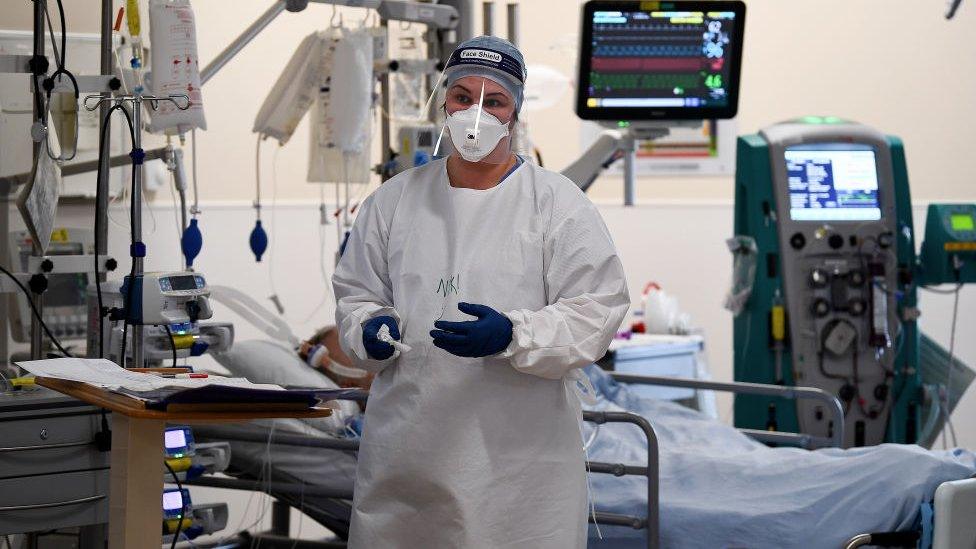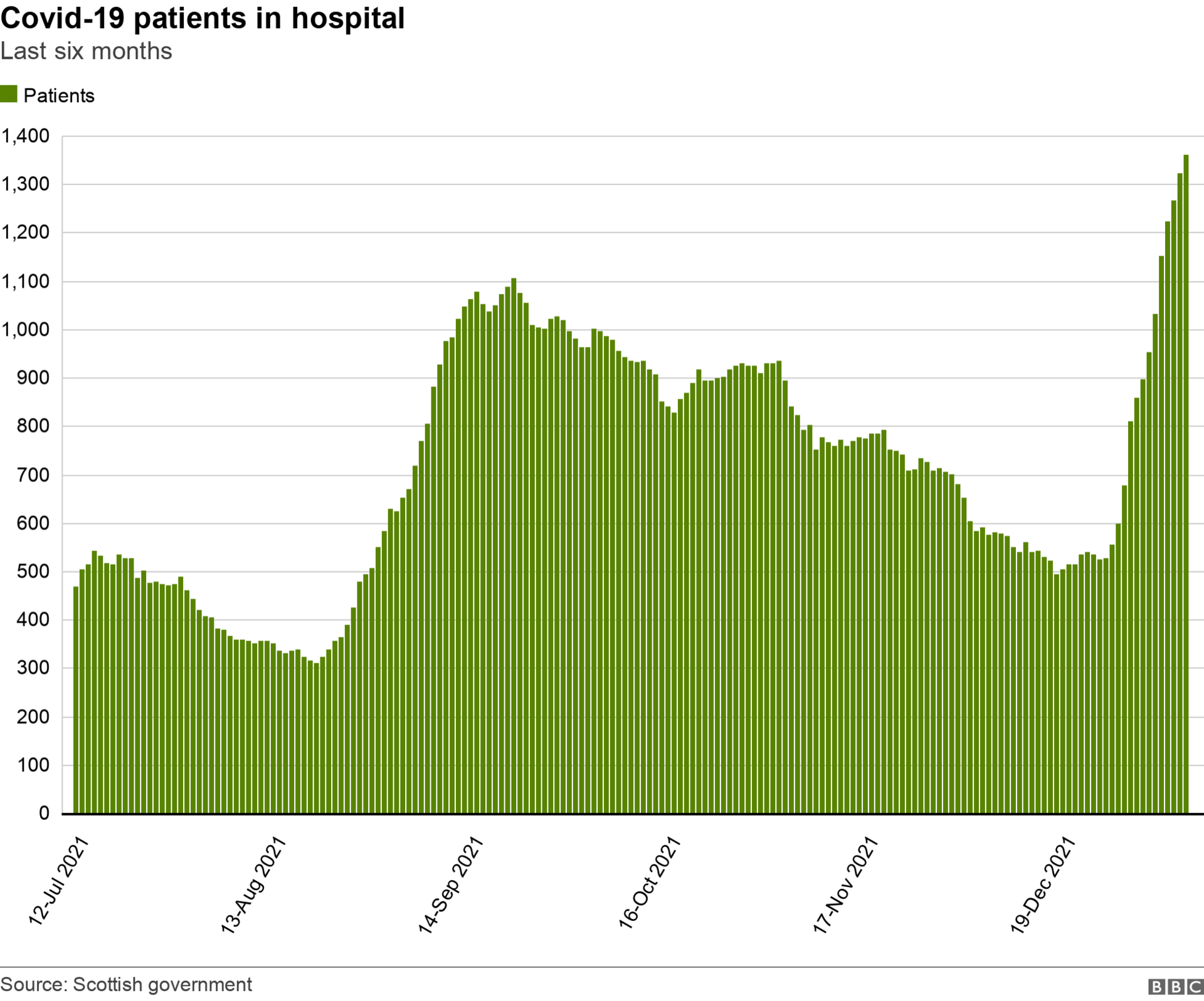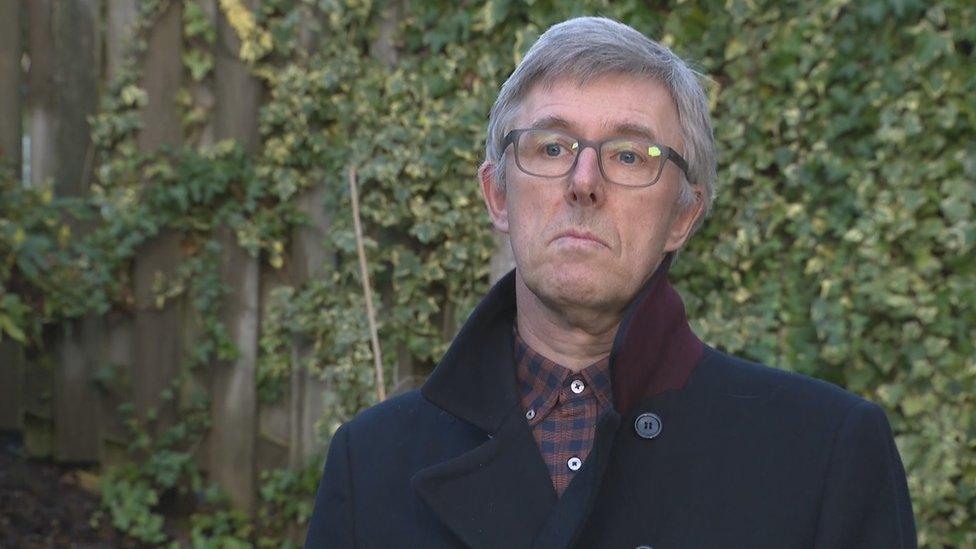Covid in Scotland: Virus hospital patients increase by 50% in a week
- Published

The number of people in hospital with Covid in Scotland has increased by more than 50% in the last week, according to new figures.
The latest statistics published by the Scottish government reveal that 1,362 people were in hospital with the virus on Friday - up from 897 on Hogmanay.
A total of 48 Covid patients were in intensive care, up from 34 a week ago.
Health Secretary Humza Yousaf has said the next two weeks were set to be the "most difficult" ever faced by the NHS.
Senior medics told BBC Scotland that pressures were being felt in hospitals, GP services, the ambulance service and in social care settings.
The number of Covid patients in hospitals has been increasing since about Christmas, following the emergence of the highly-transmissible Omicron variant.
Official statistics show there was a 70.5% increase in patients with Covid in the week between Christmas and new year.
A small study of two health boards found that about 40% of patients testing positive for Covid were admitted to hospital for other reasons.
Daily case numbers appear to have levelled off but they remain high, with 12,602 reported on Saturday. Twenty-six deaths were reported within 28 days of a positive test.
The Office of National Statistics estimate that about one in 20 people had the virus in Scotland last week.

Dr John Harden, Scotland's deputy national clinical director, said increasing numbers were being admitted to hospital with Covid but there had not been a "dramatic" increase in intensive care numbers.
"And thankfully we're not seeing a huge increase in the number of people dying as well - although we are seeing increasing deaths which is always tragic," he added.
Urging people to get vaccinated to prevent serious illness, Dr Harden said every part of the health service was under pressure.
"It's not just the hospitals, it's the GPs, it's the social care setting, it's the ambulance service - they're all under pressure because of the number of people using the services but also because their staff are getting Covid as well.
Staff absences
There is evidence that Omicron is less severe than other variants of Covid and therefore leads to fewer hospitalisations.
But Mr Yousaf has warned that "a small percentage of a big number" will put pressure on a health and social care service which is already feeling the strain.
Like other sectors, it is suffering from high levels of Covid-related staff absences.
At the end of last week about 3.1% of the NHS workforce and 9.1% of adult care home staff were absent for Covid reasons.
In response, military personnel have been drafted in to help health boards in Grampian, Lanarkshire and Ayrshire and Arran.
And NHS Grampian has warned staff that it could declare a major incident next week due to an "exponential growth" of Covid cases in the region.

Dr John Montgomery said the crisis in hospitals was having a knock-on effect on GP surgeries
The crisis in hospitals is having a knock-on effect on GP surgeries in Scotland, according to Dr John Montgomery, who chairs the south of Glasgow GP committee.
He told BBC Scotland that his four-partner practice in Govan would normally deal with 1,100 consultations per month before the pandemic.
That figure has now increased to almost 2,000 a month.
In addition to treating patients with multiple, complex problems, and those like diabetes patients who need regular check-ups, their workload is being swollen with people facing lengthy waits for hospital treatment.
Dr Montgomery said: "Patients who are having to wait two or three years for a hip replacement are still in pain," he said. "They still have to be managed and they're coming to us to try and have their problems managed as best they can."
He added: "I have been practicing for 30 years. I have never known anything like this.
"We've had winter pressures, winter crises before but this is on a scale that I have never, ever encountered before.
"We do dread what's coming over the next few weeks, how we're meant to manage this potential wave of infection, how we're meant to do this with staff who are still needing to isolate, and try and deal with the routine medical conditions."

